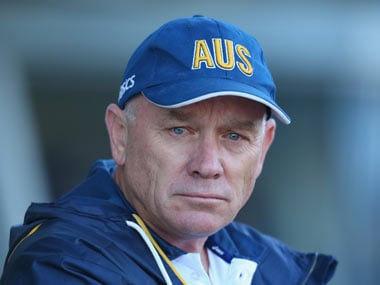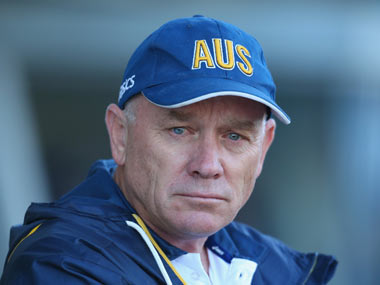Bhubaneswar: Indian hockey’s former Technical Director Ric Charlesworth has advised the hosts to be prepared for a far tougher game against Belgium on Sunday. India cruised to a 5-0 win in their inaugural match against South Africa, but the win came on the heels of poor defence and marking from the South Africans, ranked 15th in the world. Things, however, will be different against the Olympic silver medallists, reckoned the three-time World Cup medallist. Known for their stout defence, Belgium are unlikely to allow India have a free run in the flanks. [caption id=“attachment_1565857” align=“alignleft” width=“380”]  File image of Ric Charlesworth. Getty Images[/caption] “The goal difference of 5-0 might be important later, so that’s good. But they (India) will find it difficult against Belgium as they won’t get that much space. Belgium are physically stronger and they defend better than South Africa. That game (against South Africa) was not the challenge, the higher challenge will be the game against Belgium. If India want to top the Pool, they ought to beat Belgium,” the 66-year-old told Firstpost. India fluffed at least three scoring opportunities in the first half alone due to a combination of poor trapping and loss of possession, and couldn’t nail any of their five penalty corners cleanly. The two goals that were scored via short corners came through rebounds, and Charlesworth agreed that India will have to take their chances against superior opponents. “It’s tough to score on every chance because it’s generally crowded there in the circle. If you score one in three chances, you are doing well. Against Belgium, it will get tougher as it will be more crowded. You won’t get much space,” he said. On Thursday, Argentina and Spain played a breathtaking match that saw seven goals being scored, five of which came in the first 15 minutes alone. Charlesworth, who has also played first-class cricket for Western Australia, was impressed with the finishing of both teams. “There were 11 shots on goal for seven goals in the Argentina vs Spain encounter. That’s very unusual. Normally for seven goals, you might have 30 shots on the goals. There were not many mistakes that the two teams made. The finishing was brilliant, the tap-ins were of very high quality, the corners were good. Those are certain things India can take away from that match, though I won’t advice too many changes. They should stick to their strengths, which is skill and agility, and not try to play someone else’s game. If you do that, you lose. “In the previous match, Akashdeep was good, Mandeep was good, Dilpreet didn’t do much but apparently he is a good player too, so that’s good news for India. What will be interesting to see is how are India going to defend,” he added. Further, Charlesworth also threw his weight behind the stop-start Hockey India League (HIL), and credited the franchise-based competition for revival of hockey’s fortunes in the country. “India should do everything they can to get HIL back on track. Whatever progress you’ve made in past decade is due to HIL more than anything else.” The league has run into financial trouble of late, with the Delhi franchise pulling out of the competition for good. There will be no HIL this year, and the league is supposed to return next year with a tweaked, five-a-side format. Charlesworth, though, shot down the suggestion as a “waste of time” and argued that a 60-minute, fast-paced sport such as hockey doesn’t demand a change in format. “The five-a-side suggestion for HIL is a waste of time. Hockey doesn’t need a change of format. Cricket needed a shorter format, but not hockey. Maybe you can play with nine players as it has become too easy to defend these days. If you have only nine players in a side, there will be more spaces and more skill. However, I am not convinced about five-a-side. If you want to see artistry and skill in this field, maybe that’s a better solution than five-a-side. This game doesn’t need much changes; it is spectacular enough,” he said. The Olympic silver medallist at the 1976 Montreal Games also advocated the need for a robust domestic structure to ensure players who fall off the radar have a platform to show their talent and mount a comeback. “India have bit more depth than it used to be. You are World No 5 now. You are playing in a World Cup without Sardar Singh, Rupinder Pal Singh, and SV Sunil, and you still have a good team. So yes, you have depth. That’s a good thing. But I am not sure the domestic structure is solid is it ought to be,” he opined. Besides a national hockey league – Australian Hockey League (AHL) – Australia have systems in place to ensure a steady supply of players. These platforms also offer a chance to out-of-favour players to regain their form. “India can do well with a community sport structure. Back home, we have inter-club matches in cities. In Perth, most teams have a couple of internationals in their side. We also have an inter-state competition on the lines of Sheffield Shield and Ranji Trophy in cricket. Maybe, you need something like that. India also need a good inter-school competition,” Charlesworth, who parted ways with Indian hockey almost a decade back, concluded.
Ric Charlesworth threw his weight behind HIL, suggested nine-a -side hockey over five-a-side competitions, and cautioned India of the Belgium challenge.
Advertisement
End of Article


)

)
)
)
)
)
)
)
)



